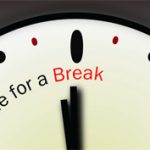In addition, having an electronic medical record system has helped the matter. “It is somewhat easier to be away because of it,” Dr. Leibowitz says. “I can log on remotely and take care of many of my own coverage tasks as if I were in the office. However, if I am sick, I should focus on resting and getting better. There is a fine line regarding how often and when to log in. It is a personal decision that each of us has to make.”
Karen Appold is a writer in Pennsylvania.
Little Support for Sick Docs
Despite the burden a doctor’s unexpected sick day might impose on patients, staff and colleagues, some physicians say it’s warranted and advisable.
“We should take off from work if we are too sick to care for our patients,” says Evan Leibowitz, MD, MS, rheumatologist, Prospect Medical Offices, Midland Park, N.J.
Stuart Kaplan, MD, chief of rheumatology, South Nassau Communities Hospital, Oceanside, N.Y., agrees. “While a strong work ethic is commendable, it is not always in the best interest of the physician or his patients to work when ill. A sick doctor is putting his patients at risk of catching whatever contagious infection he might be harboring. In addition, working while ill may prolong the illness. Therefore, it is important for physicians to know that if they are sick, they should heed their own advice and stay home and rest until they feel better.”
But the bottom line is that there aren’t any incentives for physicians to take care of themselves, says Alexa Simon Meara, MD, clinical instructor and a rheumatologist at The Ohio State University Wexner Medical Center, Columbus, Ohio. In fact, the opposite is true. “If physicians produce more (i.e., see more patients, do more surgeries and publish more papers), physicians are rewarded. If I want to see a physician myself, I have to either take a vacation day off or block my clinic early [decreasing patient access],” Dr. Meara says.
Although Ohio State University creates incentives by locking in a lower premium fee for health insurance if physicians receive an occupational health check yearly (i.e., vital signs, blood glucose and lipid panel), the policy does not mandate that physicians follow up on the results. Thanks to the Family Medical Leave Act (of 1993), employees—including physicians—can take leave if they are sick without losing their job. “However, these policies do not help physicians with the day-to-day virus, gastroenteritis, flu and so forth,” Dr. Meara says. Because of this, it is more work for a physician to cancel clinic or a day of surgeries and to find coverage for being sick, than to go to work in a less-than-healthy state, despite the potential risk to patients. “With the nature of medicine becoming more and more consumer and market driven, there is no room for physicians to be sick … so I guess I just won’t get sick,” Dr. Meara concludes

